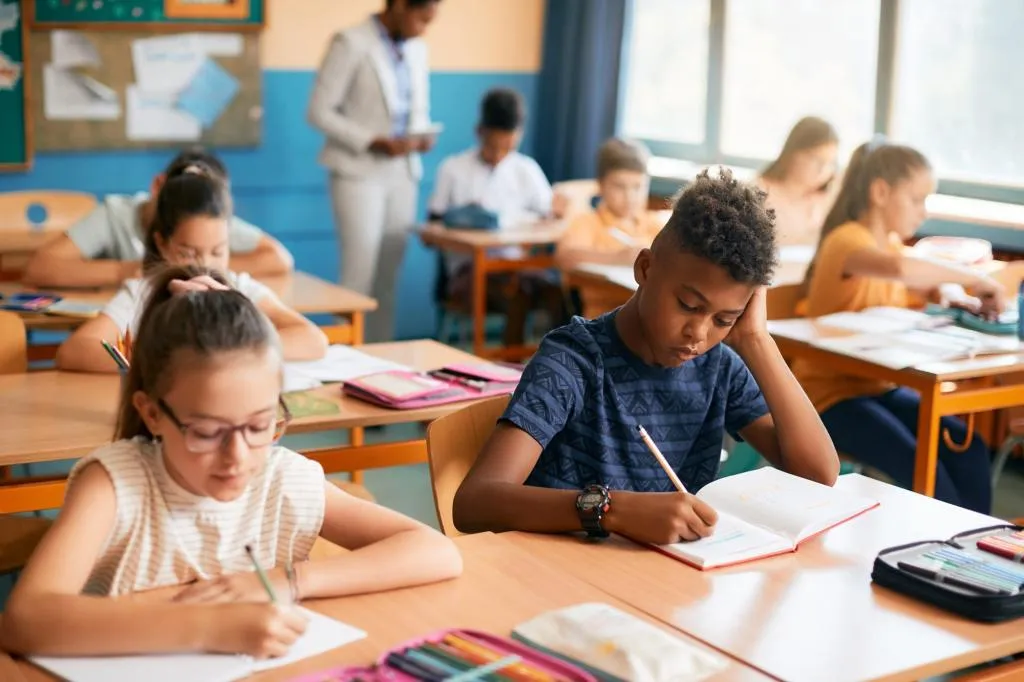For nearly a decade, New York City placed ideology over evidence in its approach to school discipline.
Restorative Justice, imposed for the sake of racial "equity," was supposed to strengthen school culture -- but instead it removed the boundaries kids need to learn and thrive.
That left too many classrooms without clear expectations, consistent follow-through or real consequences, with students told to discuss or meditate on unruly school behavior rather than receiving detention, suspension or loss of privileges.
My recent Manhattan Institute report shows how NYC spent nearly $100 million on RJ programs in less than a decade -- yet classroom disruptions, police interventions and absenteeism only worsened.
Eliminating meaningful consequences set school administrators and teachers adrift, forced to react to emergencies instead of preventing them.
Structure in a classroom means clear routines, like when to listen or when it's time to work -- with posted rules explaining what students should do and what happens when rules are broken, enforced by consistent adult follow-through.
Clarity and consistency, not abstract ideals, create safe and orderly classrooms. Extensive research confirms this commonsense concept.
But with RJ, teachers must manage disruptions through scripted conversations, asking students to reflect on their feelings rather than issuing consequences.
They've had to "build relationships," not set rules and enforce expectations -- so expectations disappeared from our schools.
Schools can't function without structure. Every student deserves a safe, orderly classroom, and teachers need tools to achieve this.
But RJ didn't supplement school discipline; it replaced it, leaving schools without tools to manage behavior.
And the students who need structure most are the ones most harmed.
As the city approaches another mayoral election, voters should be asking: Who's willing to rebuild our schools' structure?
Who's willing to say that kids need boundaries, not just conversations?
Democratic mayoral candidate Zohran Mamdani has endorsed more of the same.
"As mayor," he told Chalkbeat, "I will focus on . . . restorative-justice models, which allow our students to remain in schools, learn from mistakes, grow conflict resolution skills and improve academic outcomes."
As the largest school system in the country, NYC sets a tone for the rest of the nation. Today that tone is one of failure and discouragement.
Restorative justice has done enough damage. It's time for our schools to reestablish rules, order and accountability.
First, we must set clear expectations and consequences across all schools, empowering principals and teachers to intervene when students jeopardize learning or safety -- without waiting for central office approval.
Teachers need that backup if we want them to give our kids consistency.
Teachers also need training in evidence-based behavioral strategies, such as encouraging appropriate behavior, de-escalating disruptions and following through with reliable consequences. Let's redirect funding away from RJ to give teachers those tools.
To restore public trust, we need regular audits using measurable outcomes -- reductions in repeat offenses, fewer emergency calls and increases in uninterrupted instructional time, for example -- and to make the results public.
Within the city's classrooms, daily structure is a must. Students can't learn in chaotic environments.
Classrooms need clear routines, posted behavior expectations and consistent follow-through when rules are broken.
Finally, we must recognize that Title 1 schools, which serve the city's neediest and most vulnerable children, have been hit hardest by the breakdown of discipline.
They should be first in line for training and resources to restore order and protect student learning.
The collapse of order in our schools is a nationwide issue, as President Donald Trump recognizes: His April executive order directed the federal Education Department to promote behavior-based discipline measures.
The order instructs federal agencies to roll back past guidance discouraging suspensions and reprimands over racial-equity concerns -- guidance that spurred the rise of RJ in the city and elsewhere.
As Trump's order makes clear, imposing consequences isn't about punishment. It's about creating predictable environments in which students understand expectations and know adults will follow through.
It's about striking a balance between compassion and clarity, and recognizing that boundaries are a form of care.
New Yorkers should make school discipline a priority as they consider their vote for mayor.
Until the city rebuilds a system where all students can learn in calm, focused classrooms, children who need the most support will continue to receive the least.
Restoring disciplinary structure gives every student a better chance to succeed -- and New York City should lead the way.
